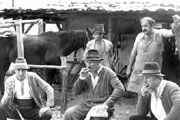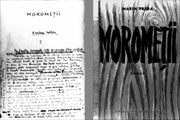Two years after Stalin's death, the relaxation of ideological grip, however timid and short, made possible the publication of a remarkable novel that would be hailed not only as one of the timeless masterpieces of Romanian modern letters, but also as one of the most poignant readings of Romania's cultural identity DNA. The year was 1955 and the author, a tormented young writer who had been almost lost after the brutal imposition of communism, was Marin Preda. The book told the story of a peasant family - the Morometes - revolving around a towering, Socrates-like patriarch and desperately trying to survive the vagaries of history and its own moral dissolution.
A celebration of one of the most seminal, identity-defining works of modern Romanian literature and a tribute to the fascinating man behind it, 'The Morometes 60: The Jubilee of a Masterpiece' is a programme that, six decades after this still consequential masterpiece took the world by storm, revisits the memorable scenes and characters of cult-author Marin Preda through film, theatre, exhibition, and conversations. An expert ensemble of internationally-acclaimed directors, actors and academics like Stere Gulea, Marcel Iureș, George Mihăiță, Jack Klaff and Caius Dobrescu will reveal the local flavour as well as the universal appeal of the Morometes' fable and will discern the still relevant messages of a society that, as ours today, must face the same question: where on earth are we heading to?
Marin Preda (1922-1980) is one of the greatest Romanian writers of all time. Born in a modest peasant family in a village lost in the great Danube plane, he started his literary career during the Second World War when, working as an obscure proofreader in Bucharest, drew the attention of the era's most revered literary critic. His debut, with the short story collection 'The Meeting between the Lands' (1948), received an enthusiastic reception for its abrupt, unsentimental depiction of the rural society. After a few conformist works during the first years of the Stalinist regime imposed by the Soviet occupation, Preda was catapulted to fame in 1955 when, taking advantage of the political and cultural thaw, he managed to publish his unsurpassed masterpiece, 'The Morometes'. The book is the realist and poignant saga of a peasant family headed by a fascinating patriarch in the turbulent years that preceded the Second World War, which confirmed the masterful storytelling, the detached eye for moral decay, the talent for subtle characterization and the irresistible humour which would pervade Preda's entire body of work. 'The Morometes' became an instant classic and bestowed upon its author a plethora of accolades and privileges. It was followed by a long string of novels of major popular appeal, dealing with various moral dilemmas of the wartime and post-war Romanian society - 'The Prodigals' (1962), 'The Intruder' (1968), 'The Impossible Return' (1972), 'The Great Loner' (1972), 'The Delirium' (1975) -, which brought their author an almost mythical stature. His 1977 memoire, 'Life as a Prey', and especially his last work, the monumental 'The Most Beloved of Earthlings' (1980), signalled not only a return to the great literary ambitions of the past but also his increasing disenchantment with the communist illusions, which didn't pass unnoticed. Increasingly bitter and isolated but still a nominal member of the establishment, Preda died unexpectedly in 1980 at the height of his reputation leaving behind a literary legacy still celebrated to these days.


